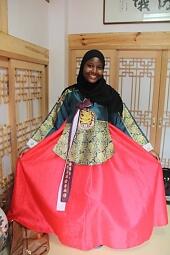 Living in Korea for two months is one of the best times of my life so far. On June 28th, I moved in at Ewha Women’s University where the Harvard summer school took place until Aug 6th. I took a morning class in documentary film-making and an afternoon class in Intermediate Korean. I truly enjoyed my documentary-film class. As a final project, my teammates and I (2 Ewha students and 2 Harvard students) made a 15-min documentary about a new Korean band in Seoul called Yimoha, which performs a mix of African drums (djembe), Native American flute and western guitar. Through this surprising combination, this band produces a nice hybrid style of music that is yet to be really exposed to Seoul commuters, in the streets of Hongdae or Itaewon, the main hubs of art in the city.
Living in Korea for two months is one of the best times of my life so far. On June 28th, I moved in at Ewha Women’s University where the Harvard summer school took place until Aug 6th. I took a morning class in documentary film-making and an afternoon class in Intermediate Korean. I truly enjoyed my documentary-film class. As a final project, my teammates and I (2 Ewha students and 2 Harvard students) made a 15-min documentary about a new Korean band in Seoul called Yimoha, which performs a mix of African drums (djembe), Native American flute and western guitar. Through this surprising combination, this band produces a nice hybrid style of music that is yet to be really exposed to Seoul commuters, in the streets of Hongdae or Itaewon, the main hubs of art in the city.
In addition to this, attending the intermediate Korean class improved a lot my proficiency in Korean. Not only was it helpful that my teacher, Mrs Park, avoided speaking English in class but it became also a habit to practice Korean with my Ewha classmates living in my dorm. I also got to interact in Korean with shop-owners, SK telecom officers (while I tried to find a phone), as well as during my stay with my Ewha Korean classmate’s family in Ulsan, further south from Seoul. Living in Korea for two months also expanded my little background about Korean culture through my discussions with Ewha students, Korean and Internationals I met at Hangang Park, Wangsimni, Chunchen and other part of Seoul. I learnt so much, especially from my roommate Yom Bom Chung, about politics in Korea, the Korea-Japan war, the Korean military enrollment duty for Korean men and many explanations as to why suicide rate is high in Korea.
Nonetheless, my favorite part about this cultural discovery is the similarities between my own Senegalese culture and the Korean lifestyle. Not only did I enjoy the home feel of eating rice and hot food everyday but I also loved seeing the ‘ahjummas’ cook the meals with so much dedication, just like home. Other trends were also similar, for instance the habit of touching wood for fear of the evil eye or tongue, the ‘chuppachup’ lollipop I used to be crazy about in my primary school and that I found in many small shops around Seoul, and the respect and warm welcome given to guests (or Teranga in Senegal). I truly enjoyed the feeling of being immersed in a new society yet still feel my own culture in the air!
Consequently, I plan to take a language-citation in Korean at Harvard and to come back for another study abroad in Korea. This second trip will allow me to intensively learn Korean and travel in the more rural places of Korea so that I can deeply experience the traditional lifestyle. Moreover, my internship with Dr Pil Ho Kim at the Institute of Development and Human Security—IDHS at Ewha GSIS, and with Dean Eun Min Kim on her undergraduate course on International development and poverty, led me to reconsider my future career options. My personal reason, in addition to the exposure I got from my internship is that being in Korea as an African, made me realize there is more room for cooperation and cultural exchanges between people in Africa and East-Asia. In fact, I often was the subject of curiosity for Korean children and elders because they have not seen many Africans. Thus, I may research and work for a Korean international agency in the goal that African countries get inspired by the Korean model of combating poverty and that Koreans can also experience their socio-cultural affinities with some African countries.
In summary, studying abroad in Korea is one of the best decisions I have ever made in my life. Thus, I am grateful to the Korea Institute and the donors for supporting students like me, who cannot fully afford the financial costs of these kinds of life-enriching experiences.
Fatoumata Fall, '14